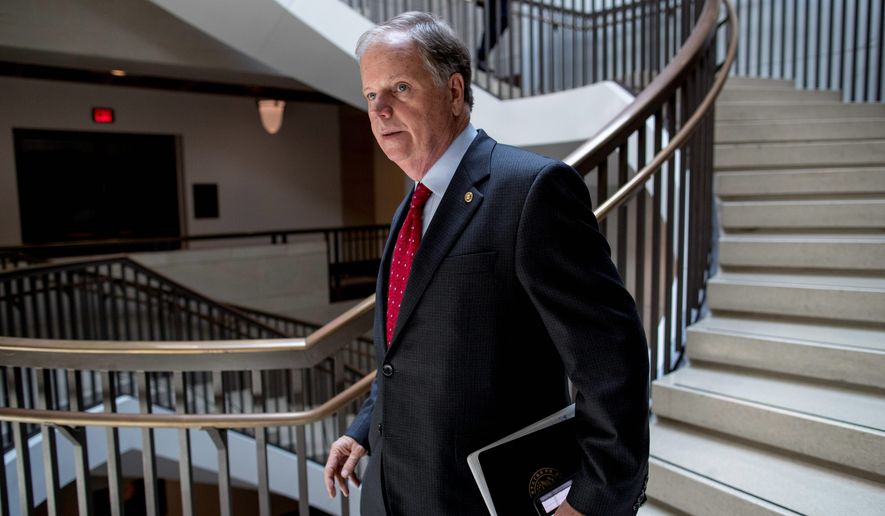OPINION:
American Public Television announced this month that it was resurrecting (literally and figuratively) “The McLaughlin Group,” but you don’t need to be a political pundit — or even play one on TV — to understand why Sen. Doug Jones has been designated the most-endangered of the 34 Senate incumbents up for election in 2020.
The Alabama Democrat is the accidental senator — the Chauncey “Being There” Gardner of the Senate — having been in the right place at the right time to eke out a narrow win in a December 2017 special election. And that was in a ruby-red state in which Donald Trump trounced Hillary Clinton 62.1 percent to 34.4 percent a scant 13 months earlier.
Mr. Jones won only because the candidacy of the Republican nominee, Roy Moore, imploded over unsavory allegations of his being inordinately interested in much, much younger women.
Even with a damaged-goods opponent, Mr. Jones squeaked in with the barest of majorities, 673,869 votes (50.0 percent) to 651,972 (48.3 percent). The 22,852 write-in votes (aka “neither of the above”) exceeded the 21,897-vote margin Mr. Jones won by.
Deep in the heart of Dixie, Mr. Jones has a treacherous re-election task ahead of him. It will require a feat akin to that of the fabled daredevil Flying Wallendas, best-known for their death-defying tightrope walking, most recently 25 stories above New York’s Times Square in June.
Mr. Jones has to walk an ideological tightrope for the next 14 months if he’s to have any hope whatsoever of winning re-election in November 2020.
Mr. Jones’ funambulism will consist of an attempt to be seen as voting in step with the conservative Alabama electorate, while at the same time not angering the Democratic base by veering too far from the party orthodoxy being driven ever-further left by the Democrats’ nearly two dozen presidential hopefuls, who range ideologically from far left to far, far left.
In March, Mr. Jones declared he would support his party’s presidential nominee, whoever it is. “I’m not going to run away from that,” he said.
That will only make it all the more difficult for Mr. Jones to pass himself off as a centrist. While he’s not a rhetorical firebrand in the fashion of, say, Sens. Elizabeth Warren, Massachusetts Democrat, or Kamala Harris, California Democrat, his positions on many issues and his Senate voting record belie the moderate image he has sought to cultivate.
On the hot-button issues, Mr. Jones has been a down-the-line liberal, thoroughly out of step with Alabama.
On abortion, Planned Parenthood gave him a 100 percent rating, while the National Right to Life Committee gave him a 0% rating, and Mr. Jones voted against the Pain-Capable Unborn Child Protection Act, which would have banned abortion after 20 weeks, except in cases of rape, incest and danger to the mother’s health.
On immigration, Mr. Jones voted in favor of so-called “Dreamer” legislation that included a pathway to citizenship for the children of illegal immigrants but no money for President Trump’s border wall, and against withholding federal funding from so-called “sanctuary” jurisdictions.
On LGBT issues, Mr. Jones was endorsed by the Human Rights Campaign and supports legislation protecting transgender students and military troops.
Nevertheless, Mr. Jones’ Senate website is conspicuously silent about his party’s far-left socialist embrace of Medicare for All, the so-called “Green New Deal” and open borders with taxpayer-funded public benefits for illegal immigrants.
Moreover, Mr. Jones no doubt is praying that Mr. Moore will again be his opponent. That prayer could yet be answered: On June 20, Mr. Moore announced his candidacy for the Republican nomination in seeking a rematch.
“Can I win?” Moore asked rhetorically (and perhaps self-delusionally), “Yes, I can win.”
Senate Minority Leader Chuck Schumer, New York Democrat, (with whom Jones has voted in lockstep on 170 of 259 votes thus far in the 116th Congress, according to a tally by Google’s news nonprofit, ProPublica) is surely praying for a Moore candidacy, too. That’s because any path to a Senate Democratic majority in November 2020 runs through Montgomery and Mobile.
Although 22 of the 34 Senate seats up for grabs next year are held by Republicans, most pundits agree that Democrats will have to thread the needle to achieve the net gain of a minimum of four seats needed to reclaim the majority. Mr. Jones’ holding the Alabama seat is a critical component of that.
Conversely, Republicans view reclaiming the Alabama seat as crucial to helping ensure they retain their majority. “We believe most Alabama Republicans realize that nominating Roy Moore would be gift-wrapping this Senate seat for Chuck Schumer,” Steven Law, the president of a Senate super PAC aligned with Senate Majority Leader Mitch McConnell told Politico in late May.
If Alabama Republicans were foolish enough to nominate Mr. Moore again, it would likely to serve only to provide a safety net beneath Mr. Jones’ disingenuous high-wire act. If elected to a full six-year term, Mr. Jones would be liberated to remove his mask of moderation, and his voting record would more likely reflect Manhattan and Malibu than Montgomery and Mobile.




Please read our comment policy before commenting.